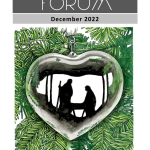Thought for the Week – 25th December 2022
Hope
Fresh from a World Cup, with the Premier League due to start again, my thoughts drift towards the greatest line ever in a film, at least that I can use in public as a vicar. “The disappointment I can take, it is the hope that kills me”; John Cleese, in “Clockwork”. Now if you are an avid listener to “Thought for the Day”, you might know where I’m going with this, as I’m basing this on a broadcast a couple of weeks ago. But even if you did hear it first time round, it is worth repeating. Because behind the words in the film is a truth. Hope can sometimes be an enemy, when it is an unrealistic hope, when it is dodging the truth, an attempt to escape reality. As a vicar, I sometimes worry that when I hear people speak about what they believe, they are actually hiding behind false hope.
I think the Christian Hope is rather different, because it is grounded in the reality that we remember at Christmas. Our hope is “God with us”; it isn’t that all our problems will magically pass away, it is that whatever happens, nothing can tear us away from the love of God. And the grounds for this hope are because God has entered into our world as one of us, experienced all that the world can throw at us, culminating in death upon a cross and triumphed over that at the end. As the carol puts it, “man shall live for evermore, because of Christmas Day”. That our hope, that is why we celebrate this season.
Rev David Poyner
Thought for the Week – 18th December 2022
What I have learnt from the World Cup
So in the week before Christmas, my thoughts turn to football…. But it was Albert Camus, a famous French philosopher who claimed that he learnt about the human condition whilst playing as goal-keeper in his local football team. And so, through the tears, I turn back to the events of last Saturday night, when yet again England fell at the quarter-finals. But it was not the match itself that struck me; I’ve watched enough football to know about the disappointment. It was the films of the England supporters watching on the big screens set up in city centres. How they shared joy; the exuberance when England scored. How they shared disappointment; the huddles at the final whistle as they embraced each other and exchanged words of consolation, trying to make sense of how they felt and how they would go forward. And then I thought about the surveys that, for many decades, have shown how people increasingly have rejected organised religion, especially, in the country, Christianity. That is true, but in the moments of glory and dejection of a big sporting event, people share in a what I can only call a spiritual experience; they share the emotions that I feel in my faith. Of course, you do not need to believe in God to experience these emotions, I doubt many of those jumping and weeping would have given the Divine a second thought. But I think it does show that we are all spiritual people; that is something that contributes to how we respond emotionally and perhaps intellectually. For those of us who have a religious faith, that gives us a way of understanding and responding to the “spiritual” side of our nature. But everyone, whether religious or not, shares in a spirituality.
Rev David Poyner
Thought for the Week – 11th December 2022
Civility
A piece of research from Harvard Business School recently caught my eye. It concerns the increasing polarisation in society. This is particularly an issue in the USA, where there seems less and less tolerance in political debate as people take extreme positions. I fear that in this country we are not far behind; we seem to be losing the ability to disagree gracefully with others. The research showed that people seem to follow those with more pronounced views on a subject than themselves; they then move their views to coincide with the views of the person they have just read or heard speak. As a consequence, there is a move to the extreme, be it left or right and a loss of toleration of different opinions. Whilst this is particularly apparent with the availability of the internet and social media, the problem is a very old one; the case for “civility” as it has been called, has been made over the centuries.
Of course, people of faith are as prone to intolerance as anyone, as can be seen in the some countries, where religious leaders are cheerleaders for extreme views. But I would suggest that this comes from a misguided, or perhaps wilful misreading of religious traditions. With Christianity, we are ultimately called to follow the teachings of Jesus, who advocated extreme love, including to those with whom we disagree. The standard is so high that, if we are honest, we will fall short, which also ought to give us some humility. Perhaps if we followed the Good News of the Kingdom of God rather than trends on social media, we might avoid the drift to intolerance and follow instead the path of civility.
Rev David Poyner
Highley Forum – December 2022
Thought for the Week – 4th December 2022
A Minority
This week, the UK Office of Census and Population has announced that for the first time, those identifying as Christians are a minority in this country; 46% put down their religion as Christianity in the 2021 census, compared to 72% in the 2001 census. I suspect I am not alone amongst vicars in being surprised that the figure saying that they are Christian is as high as 46%; it sometimes feels more like 4.6%. The number of people who regularly attend church has certainly been falling for many decades, but I suspect the census is actually showing us that people are now more honest about their spirituality, at least up to a point, by admitting that they have nothing that they want to call a religious faith.
When we consider what we believe in, be it the God of Lord and Saviour Jesus Christ or humanism and power of reason, it is essential that we are honest with ourselves. If the census now reflects that honesty, I welcome it. But questions remain. What are the values that we really follow? What is it that inspires us, moves us, drives us? My suspicion is that for many of the 46% who still identify as Christian, the daily inspiration for their lives is not Jesus Christ, although doubtless they have some connection with him. Equally, for the 34% who identify as having no religious faith, there will be a significant number who will recognise something spiritual in their lives, even if they prefer not to call that “God”. That is a decision that I hope I always respect, but my faith is that we cannot shut what I call God out of our existence. What I call the Holy Spirit is active in all lives, calling us to become more fully human, to live richer lives. Perhaps that Holy Spirit is also not to bothered what people chose to call her/him; the Spirit simply wants us to respond.
Rev David Poyner

